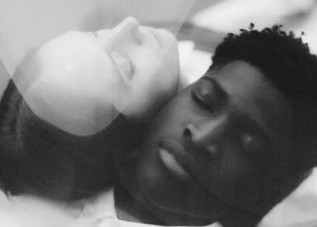
“I wish I could tell myself / don’t do it for anyone else,” sings Nandi Rose Plunkett on “Party’s Over,” one of the many bittersweet tracks on her latest release, Mythopoetics.
As Half Waif, Plunkett has been crafting strangely beautiful, buoyant, and sad music for years. With a knack for nimble electronic beats and thought-provoking lyrics, she’s always been uniquely talented at capturing the strange sense of being isolated in your own mind while acutely feeling for others. Now, though, she seems to be intent on reclaiming her own sense of personal autonomy.
The term “mythopoetics” means “of or relating to the making of myths” or “serving to create or engender myths,” according to Dictionary.com. The genre “mythopoeia” is one where a fictional mythology is created by a writer or creator. From J. R. R. Tolkien to H. P. Lovecraft, the worlds often interpolate various mythologies and archetypes while also creating their own.
Here, Plunkett’s mythology appears to be the expansive map of her own mind. With intricate and specific lyrics that will be relatable to anyone who compulsively overthinks, Mythopoetics succeeds most when it leans deep into harmonies and takes explorative risks.
Sometimes, the mythology forms less of a cohesive world and more of a scattered strobe-lit slideshow, or a portrait of a fragmented mind. Plunkett constantly switches the center of focus between her deep pain and her growing power and autonomy; these songs are about both bravery and fear, and they fixate on the oscillation between the two.
For example, “Midnight Asks” is a slightly stressful song that sounds like it could be about a liberating late night drive — until it becomes a song about terror. “Midnight asks me to get out of bed / Take the low-lit road to the trailhead / Strips the coals from my body / Run naked til I am spent,” she sings, inviting the reader into a wild, primal journey.
But then again, the song’s central refrain, “Eyes on the signs! / And the road I don’t wanna die” is not exactly an uplifting battle cry. There’s a sense of constraint even among the most ambitiously arranged songs, and every moment of release is paired with another flinch, another recoiling.
Plunkett is an extraordinary composer and producer, perpetually threading knotty beats with streamlined synths, but here the production feels a bit too complex, a bit too jarring for easy listening but not coherent enough to dance to.
Perhaps this is on purpose. The album was, after all, meant to be a challenging, thorny work, an excavation of the pain and the contradictions that define so much of life. Much of it is dedicated to exploring the traumas and mythologies of Plunkett’s own family. “My mom was a refugee, and her family — they lost their home twice, in India and in Uganda, so that’s a story of displacement that’s been coming through that side of my family,” Plunkett told New Noise Magazine. “And then this other side, which is like addiction, and depression, and a lot of darkness and trying to work through that.”
Half Waif – “Swimmer”www.youtube.com
The record was also made amidst the turbulence of quarantine, created almost by accident. Plunkett originally entered the studio to record piano covers of old songs and found herself writing big, ambitious songs, enough to fill a whole album, perhaps enough to build a world.
At times the album does truly shine. Its best two tracks, “Take Away the Ache” and “Sourdough,” reach magnificent heights. The first is a euphoric electronic track that reaches almost theatrical levels of expression, and the second could be a tribute to the compulsive bread-making many of us did during the pandemic, or to the importance of small comforts amidst a world of loss. “I would share my own blood if it would help the ones I love,” she sings. “Though I’d shrivel like a plum I would smile to see them go.”
A blend of agony and joy and the bittersweetness of loving someone knowing you will one day lose them: These contrasts shoot through the album. You can feel Plunkett’s pain in every note, and it sounds like she’s singing each line through gritted teeth.
One almost wishes she would just release everything, scream it out or let the music fall into an instrumental climax; but instead every time a song opens up it pulls back almost as quickly. Such is love and life, especially when you’re an overthinker and a perfectionist like Plunkett is, but that doesn’t mean it’s not exquisitely painful to hear it reflected back in sound.













